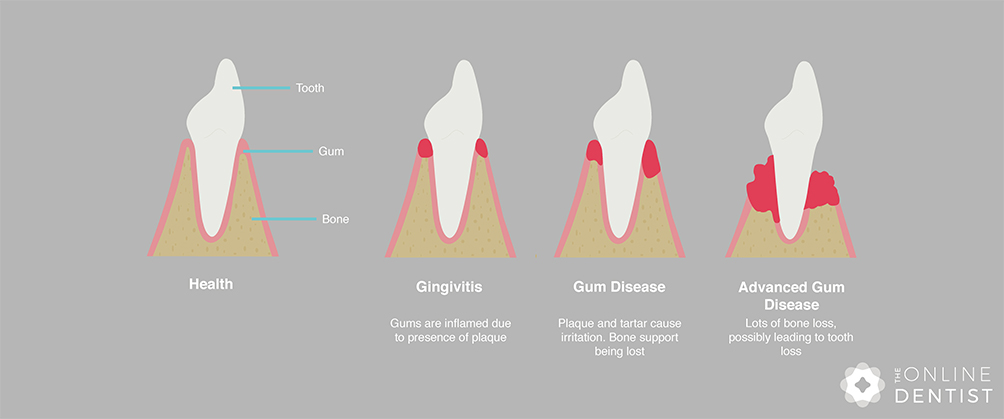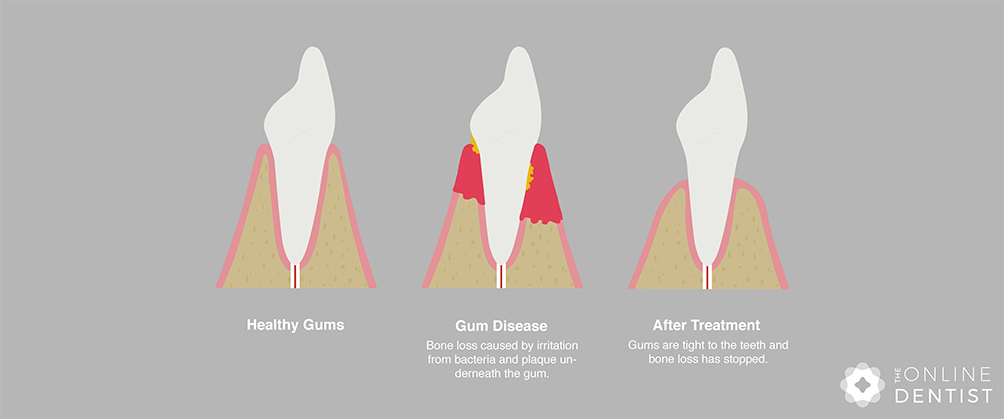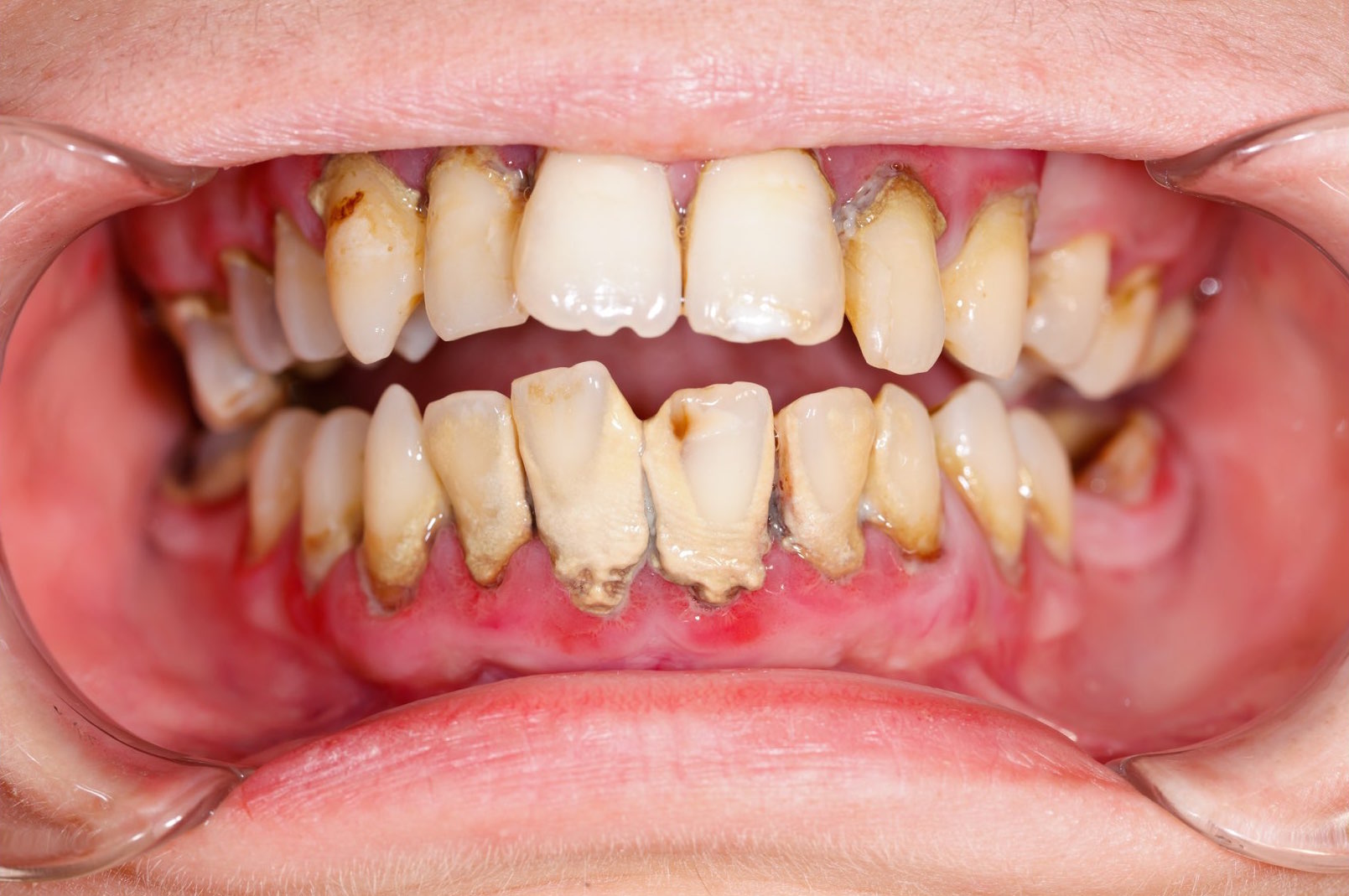What is gum disease?
Gum disease is a common condition in which the gums become inflamed. The inflammation is caused by bacteria that get below the gums. This inflammation erodes the bone support around your teeth which can eventually lead to tooth loss.
What is gingivitis?
Gingivitis is when the gums are reversibly inflamed. The gums are being irritated by plaque (a soft build-up of bacteria). If you have gingivitis, you may notice your gums bleed when you brush, and you may be able to see plaque build-up around the gums. If gingivitis is not treated, it can progress to gum disease.
What is periodontitis?
Periodontitis is another name for gum disease. ‘Peri’ means around, ‘dont’ means tooth and ‘itis’ means inflammation. Therefore, periodontitis literally means inflammation around teeth.
The gums, bone and tissues that support the teeth are affected. The gums form pockets around the teeth that trap plaque and bacteria. The bone that supports the teeth may be gradually lost, and so the teeth become wobbly. In advanced cases, teeth can be lost because of periodontitis.

What causes gum disease?
Plaque is the main culprit. It is made up of the bacteria which are responsible for causing the inflammation. You may notice this inflammation if your gums are red, swollen or bleed when you brush.
What else may contribute to gum disease?
Smoking, stress, genetics and certain medical conditions can all contribute to gum disease.
Smoking is known to be a major risk factor. Smoke affects the health of the mouth negatively in many ways, and so smokers are more likely to have gum disease and less likely to respond well to treatment.
Diabetes and gum disease are also closely linked. Diabetics with periodontitis may notice their gums feel better when their diabetes is well controlled, and vice versa. It may be a good idea to be tested for diabetes if you are diagnosed with periodontitis.
There is also a strong family link when it comes to gum disease. If your mum, dad or close family have had gum disease before, you may experience it too. You should tell your dentist about this at your regular check-up, so it can be monitored.
What is the treatment for gingivitis and gum disease?
Gingivitis is simple to treat. Good brushing and flossing twice daily to remove plaque, in combination with regular dental visits, should treat the gingivitis. If it is not treated, it can progress to gum disease.
Periodontitis (gum disease) is treated by deep cleaning your teeth, under the gums, to remove the plaque and bacteria causing the problem. Your dentist may take measurements around your teeth and compare these a few months apart to record improvements. If your teeth and gums do not respond to treatment, you may be referred to a dentist who specialises in gum disease, who can discuss more advanced treatment, such as minor surgery on the gums.

It is important to know that the single most important factor for treating gum disease is you! Your efforts to keep the teeth clean, by brushing twice a day, and using floss or interdental brushes between the teeth, are essential to treat the gum disease and prevent it from getting any worse.
How will I know if I have gum disease?
Healthy gums are a light pink colour, do not bleed on brushing and follow the natural shape of the tooth at the gum-line.
In cases of gum disease, the gums may be red, swollen and bleed on brushing. You may be able to see plaque and calculus built up on the teeth. Further down the line, you may notice that teeth become wobbly.
What are the alternatives to gum disease treatment?
Just as it has been said above, your efforts at home to keep the teeth clean is the most important part of treatment.
If you opt not to have any treatment for gum disease, the teeth will likely become wobbly in the future. At this stage, you could have them removed and a denture used to fill the space.
What should I do if I have bleeding gums or I’m worried about the health of my teeth?
As always, the best thing would always be to speak to your dentist. It is important to attend your regular check-ups, for a thorough clinical exam of your teeth and a chat about your concerns!
Keep updated with the Online Dentist newslettersign up today
Recent Articles
 Tooth decay is when you get holes (also known as cavities) in your teeth. This is caused by bacteria in plaque. It’s one of the main reasons why you need...
Tooth decay is when you get holes (also known as cavities) in your teeth. This is caused by bacteria in plaque. It’s one of the main reasons why you need...
 NB: If you come to this section in a rush because someone has knocked an adult tooth completely out, go to ‘Knocked out adult tooth’ article. Of course young children...
NB: If you come to this section in a rush because someone has knocked an adult tooth completely out, go to ‘Knocked out adult tooth’ article. Of course young children...




